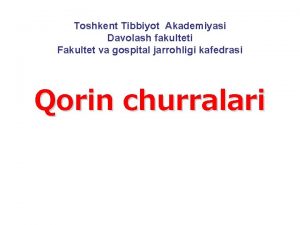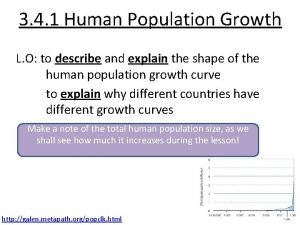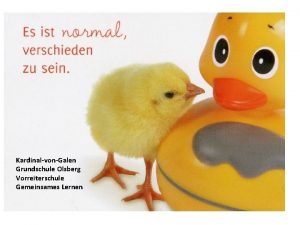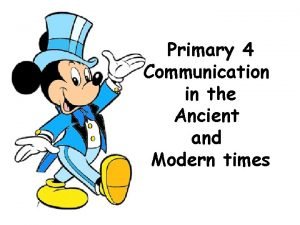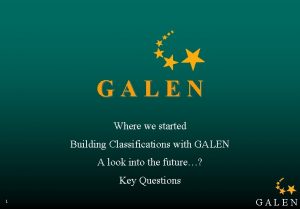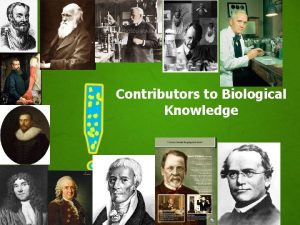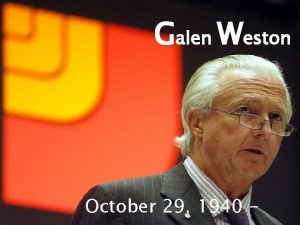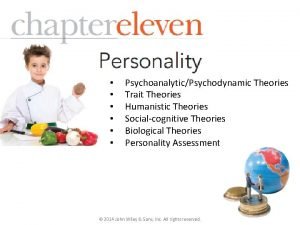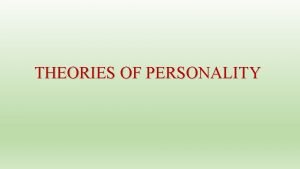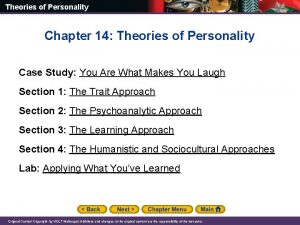KULIAH XI PERSONALITY Personality Theories Galen ancient Greek











- Slides: 11

KULIAH XI PERSONALITY

Personality Theories Galen ancient Greek theory 1. 2. 3. 4. Choleric : bad-tempered and irritable Melancholic : gloomy and pessimistic Phlegmatic : sluggish, calm, unexcitable Sanguine : cheerful, passionate

Cattell : 16 Personality Factors 1. 2. 3. 4. 5. 6. Cool – Warm Concrete thinking - Abstract thinking Affected by feelings – Emotionally stable Submissive – Dominant Sober – Enthusiastic Expedient (practical) – Conscientious (perfectionist) 7. Shy – Bold 8. Tough minded – Tender minded

Cattel : 16 Personality Factors (continued) 9. Trusting – Suspicious 10. Practical – Imaginative 11. Forthright (lugu) – Shrewd (licik) 12. Self assured – Apprehensive 13. Conservative – Experimenting 14. Group oriented – Self sufficient 15. Undisciplined – Controlled 16. Relaxed - Tense

Eysenck : 3 Personality Factors 1. 2. 3. Extraversion vs Introversion Neuroticism vs Emotional Stability Psychoticism vs Self Control Extraversion : outgoing, high level of activity Introversion : avoids crowds, solitary activity Neuroticism : anxiety, worry, guilt Emotional Stability : relaxed, at peace with self Psychoticism : aggressive, egocentric, antisocial Self-control : kind, considerate, obedient of rules and laws

Galen and Eysenck Combination • Choleric : Extravert + Unstable : Touchy, restless, aggressive, excitable, changeable, impulsive, optimistic, active • Melancholic : Introvert + Unstable : Moody, anxious, rigid, sober, pessimistic, reserved, unsociable, quiet. • Sanguine : Extravert + Stable : Sociable, outgoing, talkative, responsive easygoing, lively, carefree, leadership • Phlegmatic : Introvert + Stable : Passive, careful, thoughtful, peaceful, controlled, reliable, even tempered, calm

PSYCHODYNAMIC THEORY OF PERSONALITY • Sigmund Freud : 1. Id : Unconscious energy of psychic instincts pleasure principle 2. Ego : The self, controls and integrates behavior to demand of reality principle. 3. Superego : The conscience, the internalization of norms and values of society.

Defense Mechanisms The Ego contains defense mechanisms when id conflicts with superego. Triggering factor : anxiety • Repression : feeling, idea or memory is prevented from consciousness. Contoh: tidak tahu mengapa tidak suka ke laut. • Sublimation : diversion of energy from unacceptable drive to acceptable one. Contoh : Senang berantam, disalurkan dalam sport tinju. • Reaction Formation: replacing a threat with its opposite. Contoh : pernah narkoba menjadi aktivis gerakan narkoba. • Rationalization : inventing acceptable reason for a less acceptable reason of behavior. Contoh : saya merokok karena kasihan pada yang punya warung, supaya laku. • Projection : denial of desires and finding them in others. Contoh : Gagal bertanding, yang disalahkan orang lain • Conversion : outlet for psychic conflict in form of physical symptom. Contoh : takut ujian, jadi benar-benar sakit.

Influences on Personality • Heredity : genes • Biological : brain, nervous system • Behavior : stimulus – response • Social learning theory : reward, punishment

Humanistic approach to Personality • Abraham Maslow : Needs are universal human behavior holistic. • Maslow’s hierarchy of needs : 1. 2. 3. 4. 5. Physiological/biological needs Safety needs Social needs : belonging and love needs Esteem needs Self-actualization needs

Assignment • Give examples of defense mechanisms among the people you know. • Give your views and analysis.

